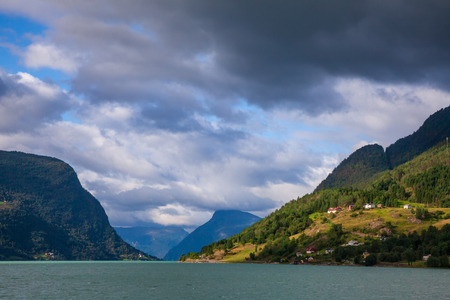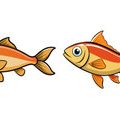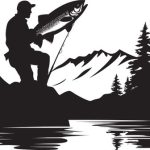Kicking Off in the Blue Ridge Mountains
Our Carolina fishing road trip begins high up in the scenic Blue Ridge Mountains of Western North Carolina. Known for their breathtaking views and cool, clear streams, this region is a paradise for anglers looking to hook native brook trout. We’re starting our adventure near Asheville and Boone—two charming mountain towns that serve as perfect basecamps for exploring nearby waters.
Chasing Native Brook Trout
The native brook trout, or “specks” as locals often call them, are the only trout species native to the Eastern U.S., and they thrive in the cold, oxygen-rich streams of the Blue Ridge. These fish aren’t just beautiful—they’re a symbol of wild, unspoiled nature. In Western North Carolina, you’ll find plenty of designated Wild Trout Waters where these elusive fish can be caught using artificial lures or flies.
Top Fishing Spots Near Asheville and Boone
| Location | Type of Water | Target Species | Local Tip |
|---|---|---|---|
| Davidson River | River | Brook, Brown & Rainbow Trout | Try early mornings with dry flies for less pressure. |
| Wilson Creek | Stream | Native Brook Trout | Use small spinners or nymphs in pocket water. |
| South Toe River | River | Brook & Rainbow Trout | Wade upstream quietly—these trout spook easily. |
| Upper Watauga River | River | Rainbow & Brown Trout | Czech nymphing works well in deeper runs. |
Gear Up for Mountain Fishing
You don’t need a ton of gear to get started here. A 3- to 5-weight fly rod or an ultralight spinning setup will do the job just fine. Don’t forget your North Carolina fishing license and check local regulations—many streams have special rules to protect wild fish populations. Lightweight waders and good traction boots are also key since mountain streambeds can be slippery and uneven.
A Taste of Mountain Town Charm
When youre not on the water, take time to explore Asheville’s craft breweries or Boone’s cozy downtown cafés. Both towns offer a welcoming vibe and plenty of local flavor. Plus, you’ll find friendly outfitters and fly shops ready to point you toward hot spots or help you stock up on local fly patterns like the Thunderhead or Green Weenie.
This first leg of our journey sets the tone for a road trip that winds through changing landscapes—from misty mountains to salty marshes—with unforgettable fishing at every turn.
2. Lakes and Reservoirs of the Piedmont
As you head east from the Blue Ridge Mountains, the terrain begins to soften into the rolling hills of the Piedmont region—a perfect transition zone on your Carolina fishing road trip. This area is dotted with some of North Carolina’s most popular lakes and reservoirs, offering a classic Southern fishing experience that blends natural beauty with laid-back charm.
Cast a Line in Largemouth Country
The Piedmont is famous for its warm-water fisheries, and if youre chasing largemouth bass, this is where youll want to slow down and spend some time. Two standout spots are Lake Norman and Jordan Lake, both known for quality bass fishing and easy access for travelers.
Lake Norman
Located just north of Charlotte, Lake Norman is the largest man-made body of fresh water in North Carolina. With over 500 miles of shoreline, this lake offers plenty of space to explore by boat or from the bank. Its also home to healthy populations of largemouth bass, crappie, catfish, and even striped bass.
Quick Facts: Lake Norman
| Feature | Details |
|---|---|
| Nearest City | Charlotte, NC |
| Main Species | Largemouth Bass, Catfish, Crappie, Striped Bass |
| Boat Access | Multiple public ramps and marinas |
| Best Time to Fish | Spring and Fall mornings |
Jordan Lake
Southeast of Durham and Chapel Hill, Jordan Lake offers a quieter setting with abundant wildlife and scenic coves. It’s one of the top spots in North Carolina for catching big largemouth bass. The lake is also well-known for its bald eagle population, so keep an eye on the skies while youre waiting for a bite.
Quick Facts: Jordan Lake
| Feature | Details |
|---|---|
| Nearest City | Apex/Pittsboro, NC |
| Main Species | Largemouth Bass, Crappie, Catfish |
| Boat Access | Nine public access areas with ramps |
| Best Time to Fish | Early morning in late spring through fall |
Piedmont Fishing Tips for Travelers
- Bring versatile gear: Medium-heavy spinning or baitcasting setups work great for bass and catfish.
- Use local baits: Soft plastics like trick worms or crankbaits mimicking shad are popular choices here.
- Check regulations: Each lake may have specific rules on size limits or creel counts—check NC Wildlife Resources Commission info before heading out.
- Mingle with locals: Visit nearby bait shops or diners to get up-to-date tips on what’s biting.
The Piedmont region offers more than just a place to stop—it’s a destination in itself for anglers. Whether youre tossing topwater lures at sunrise or drifting live bait in a shady cove, these lakes deliver that classic Carolina charm with every cast.
![]()
3. Rivers That Cut Through Carolina
As you journey eastward from the Blue Ridge Mountains, the Carolina landscape begins to change—and so does the fishing. The rivers that carve through this middle region of North and South Carolina serve as lifelines for both wildlife and anglers. Two of the most iconic river systems here are the Pee Dee and the Catawba, each offering a distinct fishing experience that bridges the gap between mountain streams and coastal marshes.
Pee Dee River: Catfish Country
The Pee Dee River winds its way through central South Carolina, creating ideal habitats for several warm-water species. Known especially for its robust population of catfish, this river is a favorite among local anglers who enjoy bottom fishing with stink bait or cut bait. Night fishing along the banks can be incredibly productive, especially during the hot summer months when big blues and flatheads are most active.
Top Species in the Pee Dee River
| Species | Best Time to Fish | Popular Techniques |
|---|---|---|
| Blue Catfish | Late Spring to Fall | Bottom fishing with cut bait |
| Flathead Catfish | Summer Nights | Live bait near structure |
| Channel Catfish | Year-Round | Dough bait or stink bait on bottom rigs |
Catawba River: Striped Bass and More
The Catawba River flows through both Carolinas, offering cooler waters and a variety of game fish. This system is especially notable for its striped bass runs in spring and fall, drawing anglers from across the region. Kayak fishing is popular here due to easy access points and scenic views, making it a favorite for those looking to blend adventure with angling.
What You Can Catch in the Catawba River
| Species | Seasonal Availability | Preferred Method |
|---|---|---|
| Striped Bass | Spring & Fall Runs | Trolling or casting swimbaits near current breaks |
| Largemouth Bass | Spring & Summer | Topwater lures around submerged logs and vegetation |
| White Perch | Year-Round | Jigging small spoons or minnows near drop-offs |
A True Middle-Ground Experience
This river zone offers a transition unlike any other—where upland cool waters meet warmer lowland flow. It’s not just about changing scenery; it’s about switching up your tackle box and techniques too. Whether you’re drifting for stripers or soaking baits for monster cats, these rivers provide a dynamic chapter in your Carolina fishing road trip.
4. Lowcountry Tides and Inshore Action
As your Carolina fishing road trip continues from the mountains and piedmont, its time to trade freshwater for saltwater in the heart of the Lowcountry. Head into the marshes and inlets of coastal South Carolina, where tidal creeks twist through golden spartina grass and the air smells like salt and pluff mud. This is inshore fishing country—where redfish, speckled trout, and flounder thrive in the shallow, nutrient-rich waters.
Chasing Redfish in the Grass
Red drum—better known as redfish—are a favorite target for anglers throughout the Lowcountry. These hard-fighting fish cruise the flooded grass flats during high tide, tailing as they root around for crabs and shrimp. Wade fishing or poling a skiff across these flats gives you a chance at sight casting with light tackle or fly rods.
Best Times to Fish for Redfish:
| Tide Phase | Best Fishing Time |
|---|---|
| High Tide | Flooded grass flats ideal for sight fishing |
| Outgoing Tide | Redfish ambush bait flushing out of creeks |
| Low Tide | Look for fish concentrated in deeper pockets and channels |
Speckled Trout & Flounder Along the Banks
While redfish steal the spotlight, dont overlook speckled trout and southern flounder. Specks love current breaks near oyster bars or drop-offs along creek mouths. Soft plastics or live shrimp under popping corks are go-to choices here. Flounder, on the other hand, lie flat along sandy bottoms waiting to ambush baitfish—you’ll often find them near docks, grassy points, and channel edges.
Tackle Tips:
- Rod & Reel: Medium-light spinning setups (66″ to 7) are versatile enough for all three species.
- Bait: Live shrimp, mud minnows, or soft plastic paddle tails work great across species.
- Line: 10-15 lb braided main line with 15-20 lb fluorocarbon leader is a solid setup for inshore action.
The Magic of the Marsh
The real joy of fishing the Carolina Lowcountry isnt just about catching—it’s about soaking up the scenery. Sunrise over a glassy creek, egrets stalking baitfish, and dolphins cruising nearby all make this stretch of your trip unforgettable. Whether you launch from Beaufort, Charleston, or one of the barrier islands like Edisto or Kiawah, every turn of the tide brings new opportunities.
5. Carolina Coast: Surf, Pier, and Offshore Fishing
After winding through the Blue Ridge Mountains and exploring the freshwater lakes and rivers of the Piedmont, your Carolina fishing road trip reaches its salty finale along the Atlantic coast. This is where North Carolina’s diverse fishery truly shines—offering everything from easy-going surf casting to adrenaline-pumping offshore adventures.
Surf Fishing Along the Shore
Beach access is easy all along the Outer Banks and Crystal Coast, making surf fishing a favorite for locals and travelers alike. All you need is a sturdy rod, some fresh bait (like cut mullet or shrimp), and a bit of patience as you wait for flounder, red drum, bluefish, or even the occasional speckled trout to strike.
Popular Surf Fishing Spots:
| Location | Target Species | Best Time to Fish |
|---|---|---|
| Nags Head | Red Drum, Bluefish | Fall & Spring |
| Cape Hatteras National Seashore | Pompano, Flounder | Summer & Fall |
| Carolina Beach | Speckled Trout, Black Drum | Spring & Fall |
Pier Fishing: Easy Access, Big Rewards
If you’re looking for an affordable and family-friendly way to fish saltwater without needing a boat, North Carolina’s coastal piers are perfect. Most piers offer gear rentals, bait shops, and even snack bars. You can catch Spanish mackerel, sheepshead, croaker, or even king mackerel if youre lucky.
Pier Highlights:
- Kure Beach Pier: One of the oldest on the East Coast—great for Spanish mackerel in the warmer months.
- Avalon Pier in Kill Devil Hills: Known for its relaxed vibe and good runs of bluefish and spot.
- Bogue Inlet Pier: Popular with both locals and visitors for its variety of species year-round.
Offshore Fishing: Go Big or Go Home
If youre ready for something more intense, book an offshore charter out of Morehead City or Hatteras. These deep-sea trips take you beyond the breakwater to chase big game like mahi-mahi (dolphinfish), yellowfin tuna, wahoo, and king mackerel. It’s the ultimate saltwater experience—and a chance to land a true trophy fish.
What to Expect on an Offshore Trip:
- Tackle Provided: Most charters supply all rods, reels, bait, and tackle.
- Crew Expertise: Experienced captains know where the fish are biting.
- Catches Vary by Season:
| Season | Main Target Species Offshore |
|---|---|
| Spring (Mar-May) | Mahi-Mahi, Wahoo |
| Summer (Jun-Aug) | Tuna, King Mackerel |
| Fall (Sep-Nov) | Sailfish, Wahoo, Tuna |
| Winter (Dec-Feb) | Sporadic trips depending on weather; look for black sea bass nearshore |
The Carolina coast offers a fitting grand finale to your fishing road trip—from casting into crashing waves at sunrise to reeling in giants miles offshore. Whether you’re here for relaxation or adventure, there’s no better place to feel the salt spray on your face and end your journey with a full cooler and unforgettable memories.


